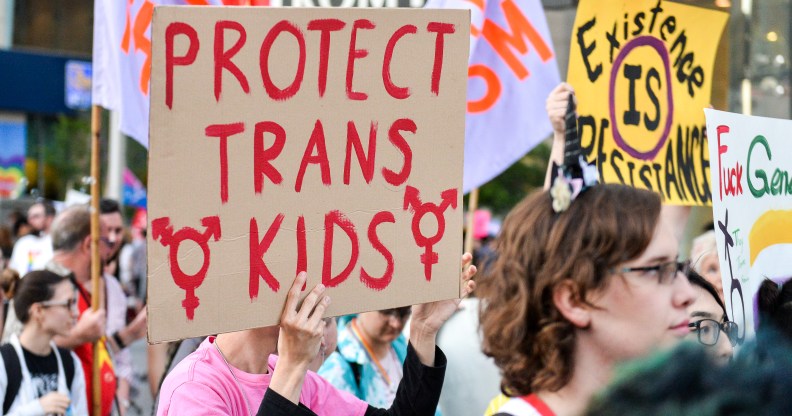LGBT youth ‘robbed’ by coronavirus, says head of suicide-prevention org The Trevor Project

(Anatoliy Cherkasov/SOPA Images/LightRocket via Getty)
(Anatoliy Cherkasov/SOPA Images/LightRocket via Getty)
The coronavirus pandemic has “robbed” LGBT+ youth – who already had a higher risk of mental-health problems – of support, the head of The Trevor Project has written.
Writing for the World Economic Forum, Amit Paley, the CEO of youth suicide-prevention organisation The Trevor Project, called for better data to understand the impacts of the COVID-19 pandemic on queer youth.
This follows a surge in the number of young LGBT+ people reaching out to The Trevor Project – the world’s largest suicide prevention and crisis intervention organisation for young LGBT+ people – reaching double the usual numbers, at times.
A study by the organisation in May found that almost a third of trans and non-binary youth have attempted suicide in the past year. The pandemic will only have “exacerbated” pre-existing problems such as this, Paley wrote.
“Prior to the pandemic, LGBTQ youth have been found to be at significantly increased risk for depression, anxiety and attempting suicide,” he said.
Paley continued: “This correlates with the minority stress model, in which experiences of discrimination, rejection and violence are compounded, and can lead to negative mental health outcomes.
“Furthermore, young LGBTQ people already faced disproportionate rates of unemployment and homelessness. It is clear that the widespread anxiety, physical distancing and economic strain caused by COVID-19 have exacerbated these concerns, and created new, unique problems for many of them.”
Widespread school closures during the pandemic have affected all youth – but Paley argues that, given LGBT+ youth are more than four times as likely to attempt suicide compared to their peers, “for many young LGBTQ people, school might be their one safe space and source of affirming community”.
“According to the Trevor Project’s research, young LGBTQ people who report having at least one accepting adult were 40 per cent less likely to report a suicide attempt in the past year. For some, that accepting person could be a teacher, coach or school counsellor.
“Another unintended consequence of physical distancing has been an increase in negative interactions. Many now find themselves confined to unsupportive home environments – which can result in increased anxiety and emotional pain, particularly among transgender and nonbinary youth, as they may need to hide their authentic selves to maintain safety.
“Among young LGBTQ people, only one-third experience parental acceptance, with an additional one-third experiencing parental rejection, and the final one-third not disclosing their LGBTQ identity until they are adults.”
Readers who are affected by the issues raised in this story are encouraged to contact Samaritans on 116 123 (www.samaritans.org), or Mind on 0300 123 3393 (www.mind.org.uk). Readers in the US are encouraged to contact the National Suicide Prevention Line on 1-800-273-8255.
